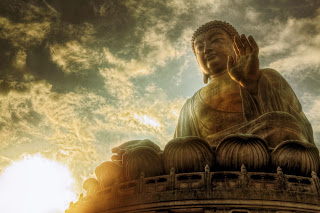Subha's youth confronts the Buddha to ask for real differences among mankind, "What is the reason and why, o Master, we meet among the humans there are short-lived and long-lived, diseased and healthy, ugly and beautiful, unaffected and influential, poor and rich, despicable and noble, witless and wise. "
The Buddha said: "All living things have karma as their own, their inheritance, for their beginning, their relatives, their protectors, it is Karma that distinguishes living beings in a state of low or high." (Majjhima Nikaya, Cullakammavibhanga Sutta, 135)
Reading the above description of karma seems to reflect that the man must be resigned and accept the circumstances of his life. On the one hand it reflects that reality, but in an optimistic viewpoint, it should not be so. As a worldly man [prthagjana / puthujjana], it is very difficult for us to be completely free from good or bad deeds. Although we are the masters of our own karma but it is evident that there are factors that negate or support the karmic fruition that can also be affected by external circumstances, environments, habits, diligent efforts and good concentration of mind.
In the life of the Buddha Gautama also recorded many criminals and even prostitutes who, because 'enlightened' by the Enlightened One, then instantly can reach a certain level of inner holiness.
The Buddha enlightens
Angulimala, a street robber and murderer who has a hobby of the little human collections he killed, at one time met the Buddha and intends to fulfill his collection to 1000 pieces. So he confronted the Buddha and intended to kill him. The notoriously nimble Angulimala in motion, still unable to touch the Buddha's visible body is utterly unmoved. Because of the exhaustion, finally Angulimala asked why the Buddha could move so fast, which the Buddha replied, "O angulimala, I have not been moving, you are still moving." Angulimala who listened to this Buddha's words finally changed instantly and became a follower of the Buddha who was able to attain Arahatship.
Alavaka, a cruel demon who hobbies eating human flesh, after meeting the Buddha can stop the habit of eating meat and reaching the first level of purity.
Ambapali, a prostitute can be cleaned up after encountering the Buddha and attaining Arahatship.

The above examples show how great the Love of an Enlightened One is able to guide and give the 'Immediate Enlightenment' to every living creature. In the Tibetan Buddhist tradition of Tantrayana / Vajrayana and some spiritual streams descended from India by the Satguru, embracing the spiritual connections of teachers and students, it is also believed that the ability of an Enlightened Master to create conditions, attracts or matures the student's karma that hinders the accumulated from life before, in order to prevent the disciple from experiencing karmic obstacles in his current spiritual life to attain enlightenment. The esoteric (secretive) Teachings of the Buddha as embraced by the Tantrayana / Vajrayana Buddhist tradition allow this to be done, either through an initiation ceremony of teacher and student relations or by means of meditation and mantra recital. In spite of all that, sraddha / saddha faith continues to play an important role.









